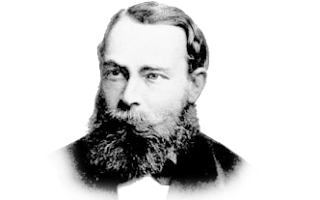 |
| Frege |
The name “foundationism” was invented by a prolific name-giver, Imre Lakatos. It refers to Gottlob Frege in his prime, Bertrand Russell in his full logicist phase, Luitjens Brouwer, guru of intuitionism, and David Hilbert, prime advocate of formalism. Lakatos saw that despite their disagreements, they all were hooked on the same delusion: Mathematics must have a firm foundation. They differ on what the foundation should be.
Foundationism has ancient roots. Behind Frege, Hilbert, and Brouwer stands Immanuel Kant. Behind Kant, Gottfried Leibniz. Behind Leibniz, Baruch Spinoza, and René Descartes. Behind all of them, Thomas Aquinas, Augustine of Hippo, Plato, and the great grandfather of foundationism—Pythagoras.
We will find that the roots of foundationism are tangled with religion and theology. In Pythagoras and Plato, this intimacy is public. In Kant, it’s half covered. In Frege, it’s out of sight. Then in Georg Cantor, Bertrand Russell, David Hilbert, and Luitjens Brouwer, it pops up like a jack-in-the-box.
In the twentieth century, we look at Russell, Brouwer, Hilbert, Edmund Husserl, Ludwig Wittgenstein, Kurt Gödel, Rudolph Carnap, Willard V. O. Quine, and a small sample of today’s authors. Philip Kitcher said the philosophy of mathematics is generally supposed to begin with Frege—before Frege there was only “prehistory.” Frege transformed the issues constituting philosophy of mathematics. In that sense earlier philosophy can be called prehistoric. But to understand Frege you must see him as a Kantian. To understand Kant you must see his response to Newton, Leibniz, and Hume. Those three go back to Descartes, and through him to Plato. Plato was a Pythagorean. The thread from Pythagoras to Hilbert and Gödel is unbroken. I aim to tell a connected story from Pythagoras to the present—where foundationism came from, where it left us.
Instead of going straight through from Pythagoras, I’ve split the story into two parallel streams—the first section is about the “Mainstream.” The second is about the “humanists and mavericks.”
For the Mainstream, mathematics is superhuman—abstract, ideal, infallible, eternal. So many great names: Pythagoras, Plato, Descartes, Spinoza, Leibniz, Kant, Frege, Russell, Carnap. (For Kant, membership in this group is partial.)
Humanists see mathematics as a human activity, a human creation. Aristotle was a humanist in that sense, as were Locke, Hume, and Mill. Modern philosophers outside the Russell tradition—mavericks—include Peirce, Dewey, Roy Sellars, Wittgenstein, Popper, Lakatos, Wang, Tymoczko, and Kitcher (a self-styled maverick). There are some interesting authors who aren’t labeled philosophers: psychologist Jean Piaget; anthropologist Leslie White; sociologist David Bloor; chemist Michael Polányi; physicist Mario Bunge; educationists Paul Ernest, Gila Hanna, Anna Sfard; mathematicians Henri Poincaré, Alfréd Rényi, George Pólya, Raymond Wilder, Phil Davis, and Brian Rotman.